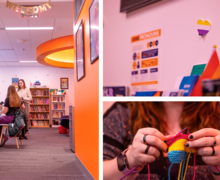Teach For America founder to promote program on campus
Most college undergraduates think about that guy or girl they met at the last party, where to get the best pizza, or who won the football game the previous night.
But Wendy Kopp, who will speak at 4 p.m. Monday in Maxwell Auditorium, had much more on her mind.
Kopp, who graduated from Princeton University in 1990, founded Teach for America, a program that trains college graduates to teach for two years in America’s poorest and neediest elementary schools. She worked out the details of her program in her senior thesis project, and the Mobil Corporation gave her a grant to put the plan into action. By 1991, the program was a success.
Today Kopp serves as the program’s president. Her speech Monday will focus on her efforts to make Teach for America succeed, including how she thought of the idea and the program’s operation, said William Coplin, professor in Maxwell School of Citizenship and Public Affairs.
“I think she’ll talk about the process by which she set it up, and it won’t just be a recruiting talk,” Coplin said. “It should be pretty open-ended.”
Heather Gibson, a current Syracuse University graduate student studying historical archaeology, participated in the Teach for America program after her undergraduate studies. She taught in Compton, California from 1998 to 2000.
“It’s amazing that (Kopp) has taken this idea from her undergraduate studies,” Gibson said.
Gibson learned about the program by attending an information session during her undergraduate study at the University of Notre Dame. She applied in a “pretty intense” interviewing process, and the program placed her in a fifth-grade Compton classroom.
“It was kind of overwhelming at first,” Gibson explained. “There were a lot of challenges.”
Jordan Brophy-Hilton, who graduated from SU in 2002 with a major in speech communications, is a member of the 2002 Corps and currently teaches in Chicago. She agrees with Gibson.
“It’s really, really challenging,” she said. “It’s the hardest thing I’ve ever done.”
Every year, thousands of college graduates apply for the program and undergo a rigorous application process. in 2002 alone 14,000 graduates applied. Once selected for the program, the new members of that year’s teaching corps are placed in a region.
Certified teaching experts train the new members for the impending two years in a five-week summer school program. Brophy-Hilton said the summer session runs in the Bronx borough of New York City for those placed in an urban location, and another session runs in Houston for those placed in southern or rural areas.
Corps members earn a regular teacher salary, and they also receive a $10,000 AmeriCorps grant for student loans or graduate school, said Coplin.
“The people in (the program) get tremendous benefits, and graduate schools and business schools value it,” he added.
The lives of the children in their classes greatly differ from the childhoods most college students have lived. The differences make the experience difficult for many teachers, but also rewarding.
“I had some kids who weren’t at the grade level, and some have learning disabilities that hadn’t been identified yet, but the kids were amazing for me,” Gibson said. “I learned more than they probably learned from me.”
Brophy-Hilton explained that she was fortunate her students are only first-graders, as the older grades tend to misbehave more.
“Basically, my kids aren’t strong enough to pick up their desks and throw them,” she said.
All of Brophy-Hilton’s students have single mothers, many in their early 20s, she said. Many have lost family members to violence, and they are accustomed to witnessing shootings and drug dealings.
“It’s a totally different world,” Brophy-Hilton said. “(The students) are so much more aware of things than I was at that age.”
Both women said they received a great deal of support from other teachers and staff at their schools, but Gibson added that although her fellow teachers were “glad to have me,” she also felt she had to prove she was genuinely interested in the well-being of the students.
“I was willing to do anything. You have to prove yourself, especially coming from outside the community,” she said. ”But all of my efforts were definitely appreciated.”
Published on November 3, 2002 at 12:00 pm





